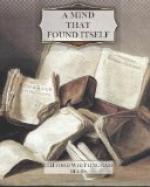XXVI
Early in March, 1902, having lived in a violent ward for nearly four months, I was transferred to another—a ward quite as orderly as the best in the institution, though less attractively furnished than the one in which I had first been placed. Here also I had a room to myself; in this instance, however, the room had not only a bed, but a chair and a wardrobe. With this elaborate equipment I was soon able to convert my room into a veritable studio. Whereas in the violent ward it had been necessary for me to hide my writing and drawing materials to keep other patients from taking them, in my new abode I was able to conduct my literary and artistic pursuits without the annoyances which had been inevitable during the preceding months.
Soon after my transfer to this ward I was permitted to go out of doors and walk to the business section of the city, two miles distant. But on these walks I was always accompanied. To one who has never surrendered any part of his liberty such surveillance would no doubt seem irksome; yet, to me, after being so closely confined, the ever-present attendant seemed a companion rather than a guard. These excursions into the sane and free world were not only a great pleasure, they were almost a tonic. To rub elbows with normal people tended to restore my mental poise. That the casual passer-by had no way of knowing that I was a patient, out for a walk about the city, helped me gain that self-confidence so essential to the success of one about to re-enter a world from which he had long been cut off.
My first trips to the city were made primarily for the purpose of supplying myself with writing and drawing materials. While enjoying these welcome tastes of liberty, on more than one occasion I surreptitiously mailed certain letters which I did not dare entrust to the doctor. Under ordinary circumstances such an act on the part of one enjoying a special privilege would be dishonorable. But the circumstances that then obtained were not ordinary. I was simply protecting myself against what I believed to be unjust and illegal confiscation of letters.




